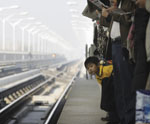Metro stations get cooler air
When Beijing started renovation work on its old metro system in preparation for the Olympic Games, Daikin Industries landed the contract to provide cool air for the stations along the Metro Line 2.
DATE 2023-11-28 AUTHOR Rita Yao SINCE BEIJING WAS NAMED HOST of the 2008 Olympic Games in July 2001, the city has plunged into preparations for the grand event, with infrastructure construction in full swing. Before the games get under way this August, Beijing will have reportedly spent 35 to 40 billion US dollars on infrastructure improvements.
SINCE BEIJING WAS NAMED HOST of the 2008 Olympic Games in July 2001, the city has plunged into preparations for the grand event, with infrastructure construction in full swing. Before the games get under way this August, Beijing will have reportedly spent 35 to 40 billion US dollars on infrastructure improvements.
Road congestion has long been a huge headache for the city, in some cases restricting development. As of August 2007, the city, which has a population of 17 million, had more than 3 million registered motor vehicles. To alleviate pressure on the existing transport routes, the municipality initiated a large-scale campaign to boost public transport by upgrading the city’s roads and building new subway and light-rail systems.
China’s capital currently has five rail lines extending 141 kilometres, and these lines carry about 2.3 million passengers
every day.
Before the Olympics start, three more lines will go into operation. The city has also taken great pains to renovate the old metro system, including Lines 1 and 2, which were built in the 1960s. According to the Xinhua News Agency, the improvements scheduled for the old metro system will give passengers mobile phone access throughout the system and shorten intervals between trains. The addition of barrier-free passages, traffic signs in Braille and handrails in subway stations will also improve access and convenience for physically challenged travellers. (The 2008 Summer Paralympics will take place in September, following the Olympics.)
A total of 144 new trains will be added on Line 2, an underground loop that parallels Beijing’s Second Ring Road. Daikin Industries, a global leader in the commercial and industrial use of air-conditioning systems, successfully landed the contract to provide 36 air conditioners for all the stations along this line.
“This line connects many major office buildings in LavalBeijing,” says Liu Yang, a Beijing-based sales engineer with Daikin. “In addition, during the period of the Olympic Games in August, many people may choose to take Line 2 and then transfer to other lines or buses to watch the events, so it was vital that this line was upgraded.”
According to Liu, Daikin won the project because it used an environmentally friendly refrigerant, R407C. “Although this still belongs to the category of Freon, it does not harm the ozone layer,” explains Liu. “In China, the use of R22, a Freon that may damage the aerosphere, is not yet completely banned, but the advantage of our products is self-evident. In addition, they also fully comply with the theme of the ‘Green’ Olympics.”
The small size of Daikin products was an important factor in its winning the contract, as was their low noise level. “Some stations are very close to residential areas, and our products are placed above ground,” Liu says. “Thus it is essential that they are unobtrusive and that noise is kept to an absolute minimum. Compared with products from European countries and the US, our products’ noise output is four to five decibels lower.”
One of the largest projects that Liu has been involved with, this renovation has also helped to build the image of the brand in the Chinese market. “Now in the busiest areas of Beijing people see Daikin products everywhere,” he says. “That’s great!”
Long-term cooperation
Alfa Laval has a well established long-term relationship with Daikin, which is Alfa Laval’s second-largest customer in China.
In the renovation of Beijing’s Metro Line 2, Daikin will supply 36 air conditioners to provide cool temperatures for all the stations along the line, and each air conditioner is equipped with four Alfa Laval brazed heat exchangers.
Liu Yang, a sales engineer with Daikin, says the company chose to use Alfa Laval’s products because of their stability and efficiency. “Also Alfa Laval can provide excellent after-sales service, such as the maintenance work,” he says.
“Our brazed heat exchangers are compact,” says Zeng Qingping, key account manager for Alfa Laval. “The largest one used in this project is the size of a nightstand, and the smallest is the size of a drawer. This coincides with Daikin’s requirement for smaller size and greater efficiency.”
Zeng explains that the brazed heat exchanger, like an evaporator, helps to transfer cooling capacity to water to accommodate required temperature modulation within the stations.
